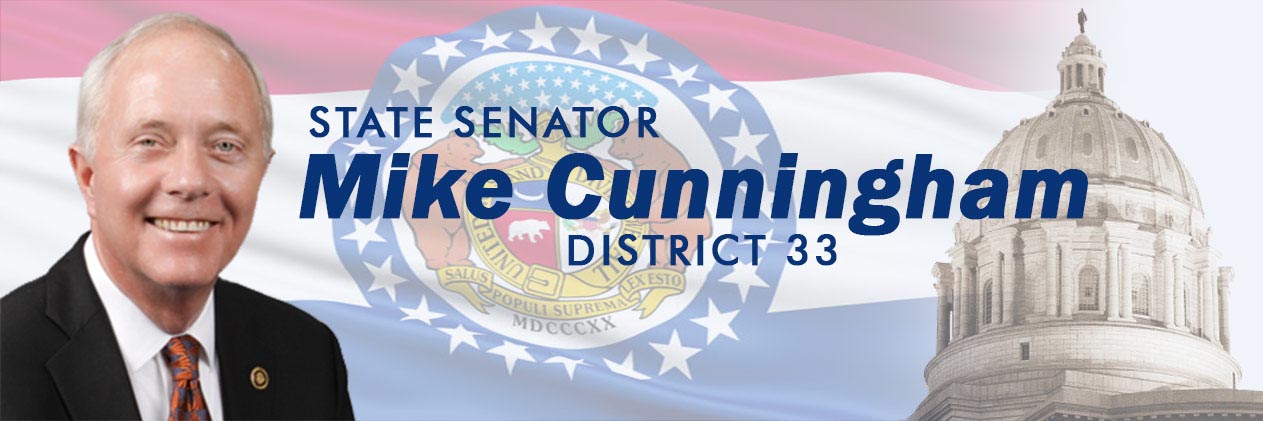
Legislative Column for June 13, 2019
Last month, the Missouri General Assembly approved a $29.6 billion operating budget for Fiscal Year 2020. The governor signed the budget bills last week, without making any changes. Every year, I receive an overview of state expenditures within my senatorial district. It’s always interesting to look over this report and see how your taxpayer dollars are spent.
The numbers provided to senators don’t tell the whole story because the Legislature generally deals with departmental budgets on a statewide basis. We rarely see county-by-county tallies of government spending. Also, the largest portion of Missouri’s budget goes directly to individuals in the form of social services, which includes Medicaid expenses, nursing home reimbursements, mental health providers and many other programs. These costs add up to nearly 45 cents out of every dollar your state government spends, but they’re not included in the annual district overview.
One significant portion of the state budget that can be broken down by senatorial district is education. The state budget for 2020 projects that $156 million from the Department of Elementary and Secondary Education will directly support kindergarten through 12th-grade classrooms in Douglas, Howell, Oregon, Ozark, Ripley, Texas, Webster and Wright counties. This is money allocated under Missouri’s Foundation Formula.
Implemented in 2006 and continuously revised since, the Foundation Formula is a complex framework intended to ensure that every public school in the state receives the funding necessary to educate children. The Formula takes into account school attendance numbers, the relative needs of students in each district, typical wages and costs of living in the various school districts and contributions from local funding sources (primarily taxes) to distribute education money to schools throughout Missouri. The Formula is complicated, but its aim is to make sure that every child in Missouri will receive a quality education.
The $156 million budgeted for the 33rd Senatorial District is roughly 1/20 of the $3.5 billion Missouri will devote to funding K-12 classrooms next year. Parents and teachers may question whether that’s enough but, as one of 34 Senate districts in the state, it’s hard to argue that we’re not getting our fair share.
In addition to traditional public schools, Missouri’s budget includes funding for three special schools for the severely disabled located within the district. Those schools, in Doniphan, West Plains and Mountain Grove, will receive just over $1.9 million next year. Another $250,000 will support Project Lead the Way, a partnership with Missouri S&T University to advance STEM education (science, technology, engineering and math) in local school districts.
The budget includes money for higher education, as well. For the first time since 2009, Missouri’s public colleges and universities will see an increase in their core funding. Most four-year institutions received a $1 million bump in the 2020 budget. Missouri State University was a big winner, however, as the Legislature provided a $10 million increase to the university’s baseline budget.
MSU’s West Plains campus will receive nearly $6.7 million next year. An additional $3.1 million is budgeted for the Ozark Region Nursing Collaboration, which will allow the university to expand its nursing degree program though the MoExcels job training initiative.
Two prisons in the district, at Fordland and Licking, are budgeted more than $20 million. A significant part of this money will go directly to prison staff, as an employee retention plan will reward corrections workers with a 1 percent raise for every two years of service. This is in addition to the 3 percent cost-of-living increase all state employees will receive in 2020. The Gentry Residential Treatment Center in Cabool, which is operated by the Division of Youth Services, is budgeted $1 million. The state also expects to spend $1.2 million on maintenance and repairs to the Highway Patrol’s Troop G headquarters in Willow Springs.
All told, the list of state budget items specifically directed to my district totaled more than $190 million. Everyone likes to complain about government spending, and it is important to keep an eye on the bottom line, but it’s reassuring to see some of that money coming home to our own area. It’s easy to think of state spending as an abstract concept. It takes on a different meaning when you know that the money is being spent to educate our kids or pay our neighbor’s salary.
It is my great honor to represent the citizens of the 33rd Senatorial District. Although the Legislature has adjourned for 2019, I remain your senator throughout the year. If there’s anything that I can do to assist you, please feel free to contact my Capitol office at (573) 751-1882.
